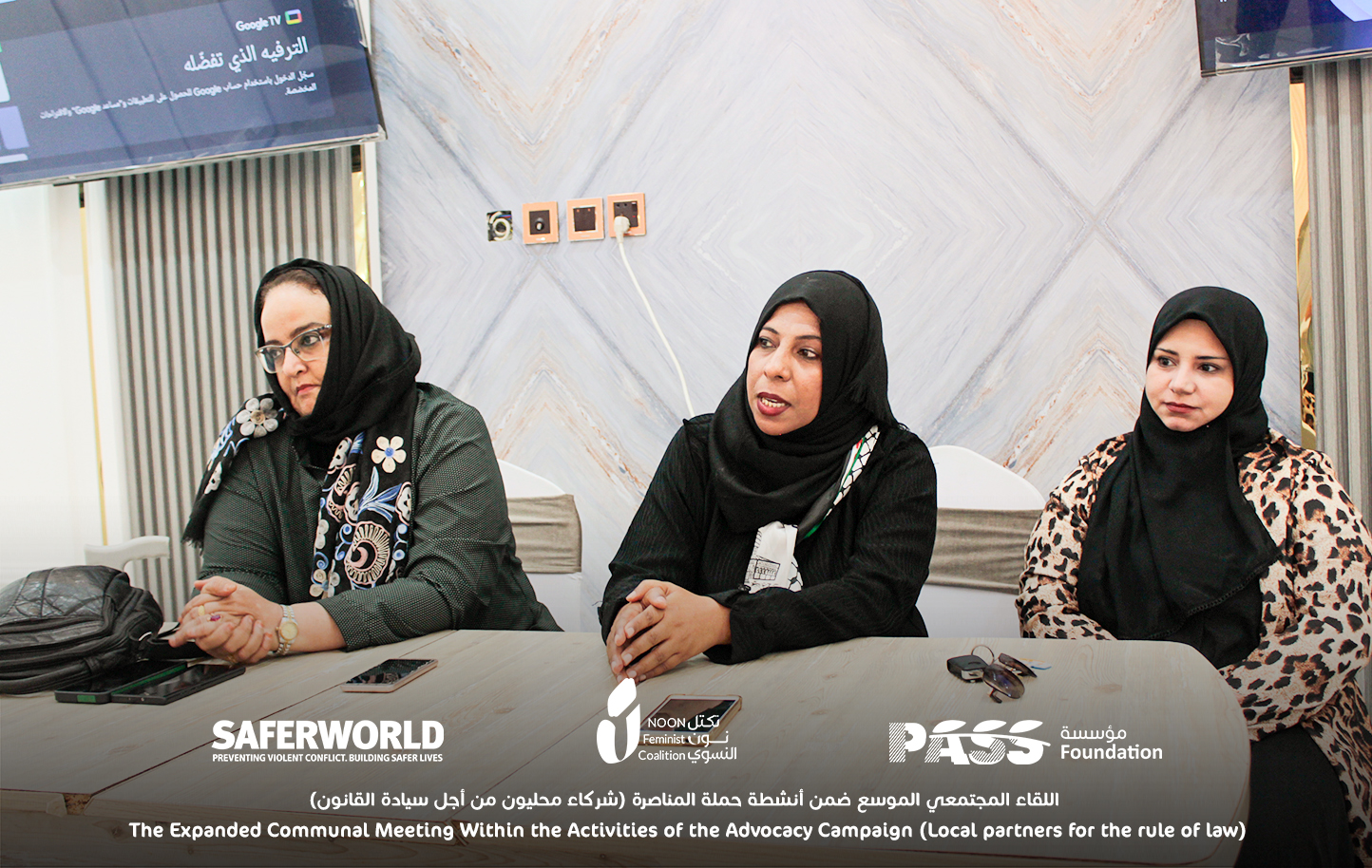The Noon Feminist Collective, in partnership with the PASS-Peace for Sustainable Communities Foundation and with the support of the Safer world organization, organized the "Expanded Community Gathering" within the activities of the "Advocacy Campaign" (Local Partners for the Rule of Law) under the second phase of the Resource Allocation Change project: Supporting Women's Rights Organizations (WORs) and Women's Networks/Collectives in Fragile and Conflict-Affected States (FCAS) in Aden Governorate. In the opening of the community gathering, Ms. Bahia Hassan Al-Sakkaf - President of the PASS-Peace for Sustainable Communities Foundation - welcomed all the attendees, each by name and capacity, from the districts of Aden Governorate. Explaining the importance of the community gathering, which coincides with the inauguration of the Electronic Extortion Department in the Public Prosecution in Aden. Adding to the importance of the advocacy campaign to raise awareness of electronic extortion crimes and the work mechanism of the Electronic Extortion Department, which was established through the efforts of the Noon Feminist Collective in partnership with the PASS-Peace for Sustainable Communities Foundation and with the support of the Safer world organization and the Office of the Attorney General in the Public Prosecution in Aden. Al-Sakkaf added that the advocacy campaign would start with community, awareness-raising, radio and television meetings, flashes and newspaper articles in order to guide the community. praising Safer world organization and all those involved in the success of holding the community gathering, which will continue for a continuous month during the implementation of the advocacy campaign activities in Aden Governorate. Judge Dr. Rawa’s Abdullah Mujahid - a member of the Noon Feminist Collective - presented a paper on the axes of electronic extortion, its risks, harms, and cybercrime. She pointed out that in any illegal behavior using electronic devices, the criminal ends up gaining material or moral benefits, while the victim suffers corresponding losses. The goal of these crimes is often piracy in order to steal or destroy information. Judge "Rawa'a" highlighted topics in electronic extortion, which is the process of threatening and intimidating the victim by publishing photos, film materials, or leaking confidential information about the victim in exchange for financial payments, or exploiting the victim to carry out unlawful acts for the benefit of the extortionists, such as disclosing confidential information about the workplace or other illegal acts. "Rawa'a" also discussed the risks and harms of electronic extortion, as well as the law on crimes and penalties, violation of privacy, threat of disclosure of private secrets, and extortion, in addition to the law on payment systems and electronic banking operations. Ms. Afra'a Al-Hariri - the coordinator of the Noon Feminist Collective - discussed the axes of rights in combating electronic crimes and liability in electronic crimes. She also elaborated on the criminal responsibility, which is "a legal relationship that arises between the individual and the state, by which the individual is obligated to the public authority to answer for his act that violates the legal rule and to submit to the reaction resulting from the violation." "Al-Hariri" noted that criminal responsibility differs from criminal capacity. She pointed out that criminal capacity is "the set of psychological factors, which in this sense is the qualification or the necessary to be available in the person so that the incident can be attributed to him as its perpetrator with awareness and will", or it is the suitability of the perpetrator of the crime to be held criminally responsible for it, and the person's potentials, in order to then judge the extent of the person's legal capacity for responsibility, as it is in this way a condition for the establishment of criminal responsibility, and the selection of it entails the selection of criminal responsibility. The community meeting included the presentation of opinions and interventions by imams, academics, activists, and civil society organizations, resulting in proposals and recommendations that are part of the advocacy campaign activities.

The Expanded Communal Meeting within the Activities of the Advocacy Campaign (Local partners for the rule of law)
 08 March 2024
08 March 2024






